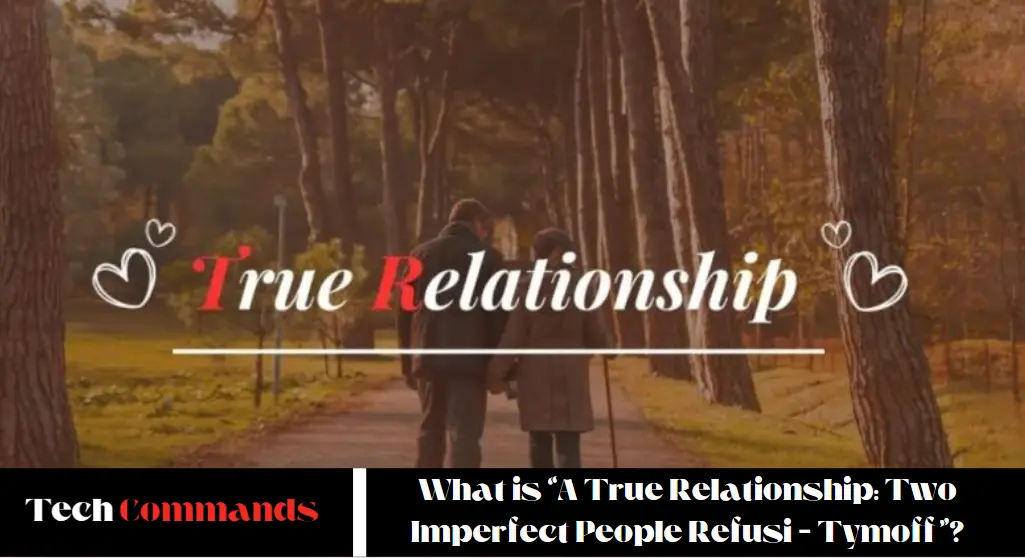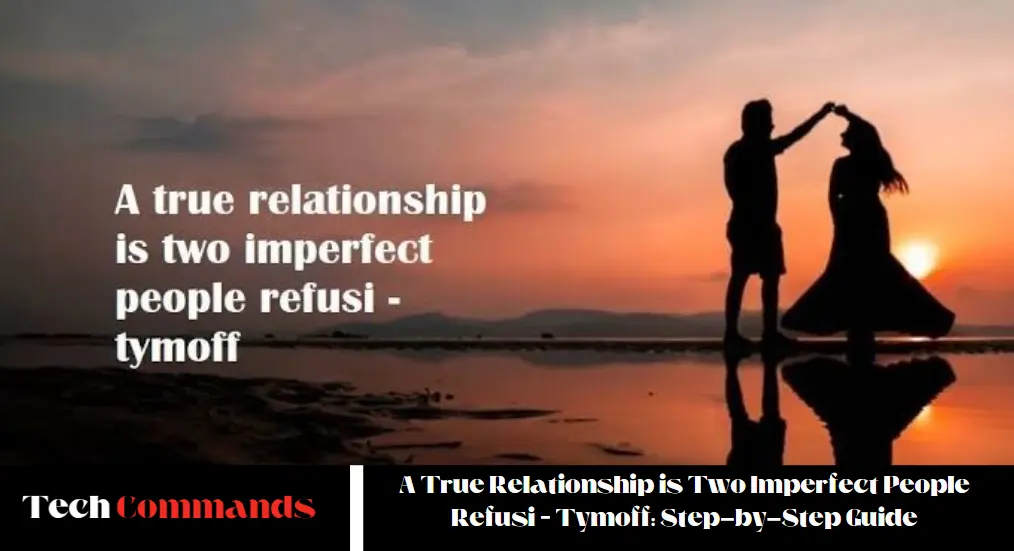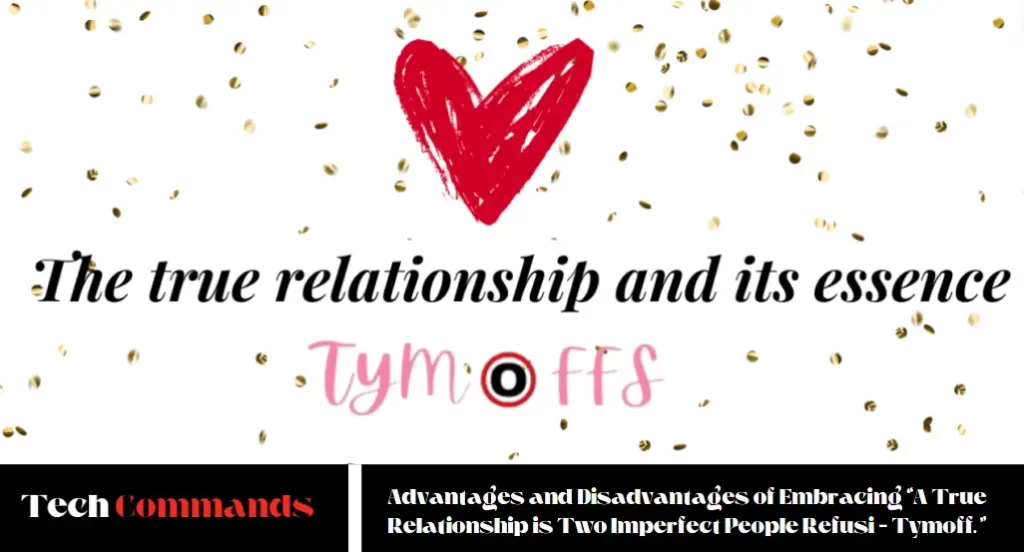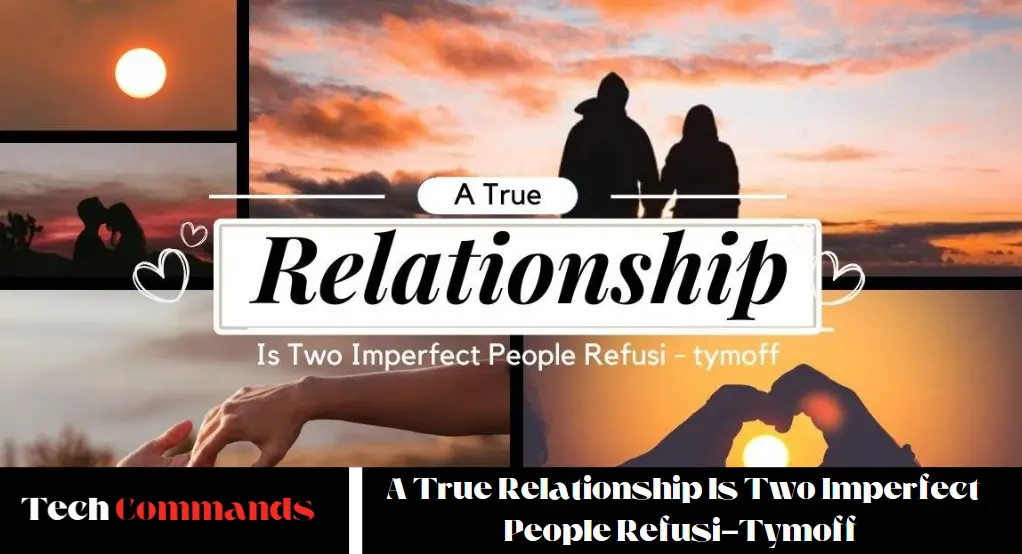A genuine relationship is two imperfect people refusing to give up on each other.” Tanya Tymoff’s profound quote encapsulates the essence of genuine love and commitment. This sentiment highlights the beauty of natural, enduring connections in a world where perfection is often an illusion. Relationships thrive not on the absence of flaws but on the mutual decision to embrace and work through them.
It is about understanding that imperfections are natural and staying together despite them. This perspective fosters resilience, patience, and growth, transforming challenges into opportunities for deeper bonding. Tymoff reminds us that love is not about finding the perfect partner but creating an ideal union through shared effort, empathy, and unwavering dedication. Embracing this mindset can lead to more meaningful and fulfilling relationships where both individuals feel valued and supported in their journey together.
What is “A True Relationship: Two Imperfect People Refusi – Tymoff”?

Picture a relationship as a dance between two individuals. Now, envision these two dancers as imperfect beings, each with flaws, quirks, and perhaps even a few rough edges. Despite these imperfections, they choose to dance together. This beautifully encapsulates the essence of Tanya Tymoff’s quote, “A true relationship is two imperfect people refusing to give up on each other.”
The heart of this sentiment lies in embracing one another’s flaws and remaining committed, regardless of the challenges that arise. It’s akin to saying, “We may not be perfect, but we’re in this together, and we’re not giving up.” This perspective emphasizes loyalty, understanding, and acceptance, celebrating each partner’s uniqueness.
It’s about choosing love over the illusion of perfection. This kind of commitment is exceptional, fostering deeper connections and a resilient partnership built on genuine affection and unwavering support.
Finding a Path with Compromise and Sacrifice
The Art of Compromise
Conflicts and disagreements are inevitable in any relationship. Tymoff underscores the importance of compromise as a key ingredient in a true relationship. It involves finding common ground, making concessions, and recognizing that sacrifices are sometimes necessary for the partnership’s greater good.
Mutual Respect and Consideration
True compromise is not about one partner “winning” or the other “losing”; rather, it is about mutual respect and consideration. Both individuals must be willing to listen, understand each other’s perspectives, and find solutions that benefit the relationship as a whole.
Why is This Important?
Understanding and embracing the idea that “a true relationship is two imperfect people refusing to give up on each other” is crucial for several reasons:
- Realistic Expectations: It sets a foundation of realistic expectations. Knowing that perfection is unattainable in relationships helps individuals accept and appreciate their partner’s flaws, leading to a more authentic and enduring bond.
- Resilience and Growth: This mindset encourages resilience. When challenges arise, couples who recognize their imperfections are more likely to work through difficulties together rather than give up at the first sign of trouble, leading to personal and mutual growth.
- Deeper Connection: Embracing each other’s imperfections fosters a deeper emotional connection. It allows for vulnerability, creating a safe space where both partners can be their true selves without fear of judgment.
- Mutual Support: It emphasizes the importance of mutual support and understanding. Acknowledging that both partners are imperfect ensures that both are more forgiving and patient with each other, strengthening the relationship.
- True Love and Acceptance: This philosophy highlights the essence of true love, which is unconditional and accepting. It shifts the focus from finding the perfect partner to building an ideal union through shared experiences, empathy, and dedication.
By valuing the concept of imperfect people choosing to stay committed, relationships become more robust, fulfilling, and genuinely meaningful. It teaches that love is not about finding perfection but nurturing a bond that withstands the test of time.
Learning from Mistakes – A True Relationship is Two Imperfect People Refusing to Give Up – Tymoff
Acknowledging Missteps
Tymoff emphasizes that mistakes and missteps are an inevitable part of any relationship. However, what sets a true relationship apart is the willingness of both partners to acknowledge these mistakes, learn from them, and use them as opportunities for growth and self-improvement.
Refusing to Give Up
In Tymoff’s perspective, a true relationship is not about perfection, but rather about two imperfect people refusing to give up on each other. It is a commitment to persevere through challenges, navigate obstacles, and emerge stronger and more resilient as a couple.
A True Relationship is Two Imperfect People Refusi – Tymoff: Step-by-Step Guide

So, you’re ready to build a genuine relationship where imperfection is accepted and celebrated? Here’s a user-friendly guide to help you navigate this beautiful adventure:
Embrace Your Imperfections
Recognize that nobody’s perfect, including yourself. Embrace your flaws, quirks, and rough edges. Remember, imperfection is what makes you unique and lovable.
Accept Your Partner’s Imperfections
Just as you embrace your imperfections, extend the same grace to your partner. Accept them for who they are, faults and all. Celebrate their uniqueness and cherish the qualities that make them unique.
Communicate Openly and Honestly
Communication is the key to any successful relationship. Be open and honest with your partner about your thoughts, feelings, and insecurities. Create a safe space where you can express yourselves without fear of judgment.
Practice Empathy and Understanding
Put yourself in your partner’s shoes and try to see things from their perspective. Empathy fosters compassion and strengthens emotional bonds. Understand that everyone has their struggles and challenges.
Read More: Trendzguruji.me Health & Beauty Complete Guide
Support Each Other Through Ups and Downs
Life is full of ups and downs, but true partners stand by each other. Offer unwavering support and encouragement, especially during tough times. Remember, you’re a team and can overcome any obstacle together.
Celebrate Your Achievements and Milestones
Take time to celebrate your accomplishments, both big and small. Whether you’ve landed a new job, reached a personal goal, or simply made it through a difficult day, celebrate together and savor the moment.
Keep the Romance Alive
Don’t forget to nurture the romantic aspect of your relationship. Surprise each other with thoughtful gestures, plan date nights, and keep the spark alive. Remember, love is not just a feeling; it’s also a choice that requires effort and attention.
Continuously Work on Your Relationship
Relationships require ongoing effort and investment. Keep communicating, growing, and learning together. Be willing to adapt and evolve as individuals and as a couple.
Seek Help When Needed
Don’t hesitate to seek professional help if you encounter challenges you cannot overcome on your own. A therapist or counselor can provide valuable guidance and support to strengthen your relationship.
Never Give Up
Above all, remember that a genuine relationship is built on resilience and commitment. No matter your obstacles, refuse to give up on each other. Choose love, choose forgiveness, and choose to keep moving forward, hand in hand.
By following these steps with dedication and love, you can cultivate a genuine relationship where two imperfect people thrive together in harmony and happiness.
Advantages and Disadvantages of Embracing “A True Relationship is Two Imperfect People Refusi – Tymoff.”

Embracing the philosophy that “a true relationship is two imperfect people refusing to give up on each other” comes with advantages and disadvantages. Here’s a closer look at both:
Advantages
Realistic Expectations
Advantage: It sets realistic expectations for relationships, reducing the pressure to be perfect and allowing partners to be more genuine with each other.
Benefit: This leads to a more relaxed and authentic connection, where both individuals can be themselves.
Stronger Emotional Bonds
Advantage: Embracing imperfections fosters deeper emotional intimacy as partners become more open and vulnerable.
Benefit: This creates a stronger, more resilient bond that can weather life’s challenges.
Increased Patience and Empathy
Advantage: Recognizing and accepting flaws encourages patience and empathy, as both partners understand that everyone struggles.
Benefit: This understanding promotes a more compassionate and supportive relationship.
Personal and Mutual Growth
Advantage: Working through imperfections provides opportunities for personal growth and mutual development.
Benefit: Partners can learn from each other’s strengths and weaknesses, enhancing their individual and collective well-being.
Long-term Commitment
Advantage: The philosophy emphasizes commitment and resilience, encouraging couples to stay together and work through difficulties.
Benefit: This can lead to long-lasting, fulfilling relationships built on trust and loyalty.
Disadvantages
Potential for Overlooking Serious Issues
Disadvantage: Emphasizing the acceptance of imperfections might lead to overlooking serious issues or red flags that need addressing.
Risk: This can result in unresolved problems that may escalate over time.
Emotional Strain
Disadvantage: Constantly dealing with imperfections and challenges can be emotionally draining for some individuals.
Risk: This may lead to burnout or hopelessness if the issues feel insurmountable.
Risk of Complacency
Disadvantage: One or both partners might become complacent, using the philosophy as an excuse to not improve themselves or the relationship.
Risk: This can stagnate personal growth and prevent the relationship from evolving positively.
Unequal Effort
Disadvantage: One partner might put more effort into embracing and working through imperfections than the other.
Risk: This imbalance can lead to resentment and inequality in the relationship.
Difficulty in Setting Boundaries
Disadvantage: Embracing imperfections might blur the lines regarding acceptable behavior, making it harder to set and enforce healthy boundaries.
Risk: This can result in a lack of respect for each other’s needs and well-being.
Embracing the philosophy of a genuine relationship being two imperfect people refusing to give up on each other has significant advantages in fostering deep, resilient connections, it also poses challenges that require careful navigation. Balancing acceptance with a commitment to growth and mutual respect is critical to making this approach work effectively.
Frequently Asked Questions
What does it mean to embrace imperfections in a relationship?
Embracing imperfections means accepting that neither you nor your partner are perfect. It involves recognizing and valuing each other’s flaws, quirks, and unique traits and understanding that these imperfections contribute to the richness and authenticity of the relationship.
Why is compromise necessary in a relationship?
Compromise is crucial because it helps balance the needs and desires of both partners. It ensures that both individuals feel heard and valued, fostering a sense of mutual respect and cooperation. Compromise helps find common ground and resolve conflicts in a way that benefits the relationship as a whole.
How can couples effectively communicate their feelings and needs?
Effective communication involves being open, honest, and respectful. Couples should create a safe space for expressing their thoughts and emotions without fear of judgment. Active listening, empathy, and validating each other’s feelings are critical components of healthy communication.
What are the benefits of acknowledging mistakes in a relationship?
Acknowledging mistakes promotes accountability and growth. It allows partners to learn from their errors, make necessary changes, and improve their relationship dynamics. This practice fosters trust and reinforces the commitment to work through challenges together.
How can couples maintain the spark in their relationship?
To keep the romance alive, couples should prioritize quality time together, engage in activities they enjoy, and surprise each other with thoughtful gestures. Regular date nights, open communication about desires and expectations, and showing appreciation can help maintain the spark.
When should couples seek professional help for their relationship?
Couples should consider seeking professional help when they encounter persistent issues they cannot resolve independently. This includes communication breakdowns, unresolved conflicts, and emotional distance. A therapist or counselor can provide valuable guidance and tools to strengthen the relationship.
How do you know when to let go of a relationship?
It may be time to let go if the relationship is consistently unhealthy or abusive or if both partners are unable to resolve conflicts despite their best efforts. If staying in the relationship causes more harm than good, it might be necessary to consider moving on for the well-being of both individuals.
Conclusion
Embracing imperfections, acknowledging missteps, and refusing to give up on each other is integral to nurturing a genuine and enduring relationship. Tanya Tymoff’s insights remind us that perfection is not a prerequisite for love; instead, the acceptance of each other’s flaws and the commitment to grow and evolve together indeed strengthens the bond between partners.
Couples can navigate challenges and conflicts with grace and understanding through compromise, effective communication, and mutual respect. By viewing mistakes as opportunities for growth and seeing obstacles as chances to strengthen their connection, couples can emerge from adversity even stronger and more resilient.

